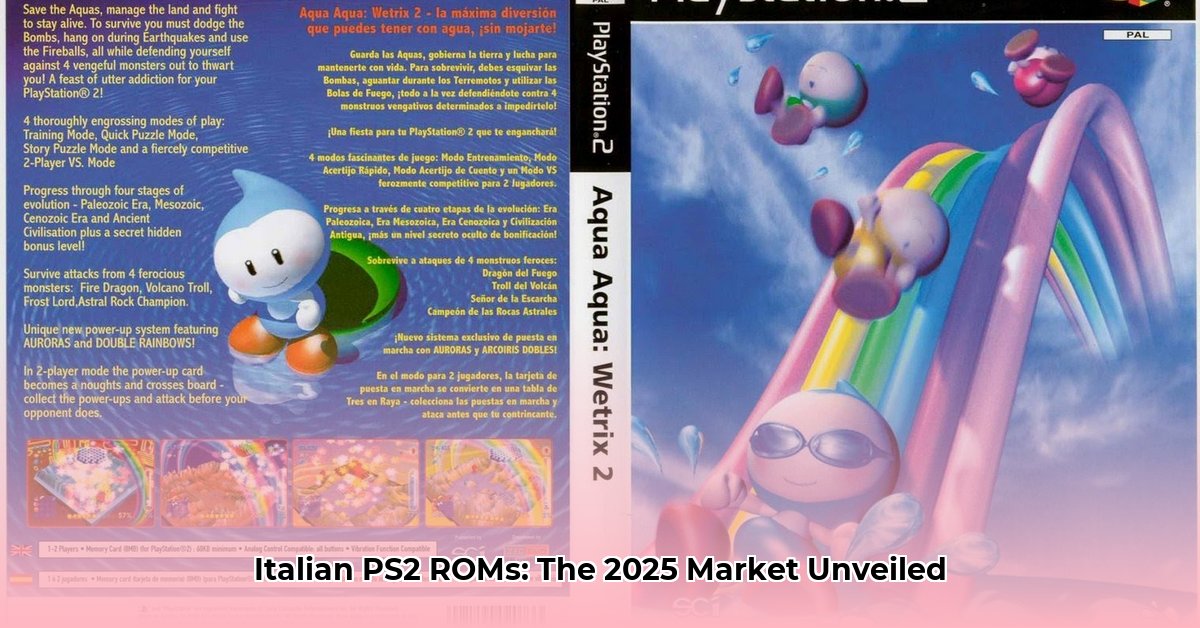
The Italian PS2 ROM Market: A 2025 Analysis
The market for Italian PlayStation 2 ROMs (ROMs PS2 ITA) presents a complex interplay of nostalgia, cultural significance, and legal considerations. This analysis examines the current state of this niche market in 2025, exploring its drivers, challenges, and future prospects. Understanding this market requires acknowledging both the passionate community driving demand and the legal complexities surrounding ROM distribution.
Is the demand for Italian-localized PS2 games purely nostalgic? While nostalgia plays a significant role, the enduring appeal of ROMs PS2 ITA extends beyond mere sentimentality. Many titles offer unique Italian dubbing or cultural references not found in other regional versions. This localized experience creates a distinct market segment, fostering a dedicated community of collectors and players.
The Landscape of Italian PS2 ROM Distribution
The supply chain for Italian PS2 ROMs is fragmented and decentralized. Sources range from high-quality "redumps" (copies made directly from original game discs) to fan-made translations and modifications. This decentralized nature presents both opportunities and risks. The quality and legality of ROMs vary greatly across different sources. Therefore, exercising caution and utilizing reputable antivirus software is crucial.
What are the key risks associated with obtaining Italian PS2 ROMs? The primary risks are legal and technical. Downloading copyrighted material without permission is copyright infringement, carrying potential legal consequences. Furthermore, downloading ROMs from untrusted sources exposes users to the risk of malware infection, potentially leading to data loss or system compromise.
Key Findings and Stakeholder Perspectives
- High Demand for Localized Versions: Popular games with Italian language support are in high demand, driven by cultural preferences and the desire for an authentic gaming experience.
- Fragmented Market: The distribution of Italian PS2 ROMs is spread across various online sources, leading to inconsistent quality and increasing the risk of malware.
- Legal and Ethical Concerns: Downloading copyrighted material is illegal, and users should be mindful of the copyright implications associated with ROM distribution and usage.
Stakeholder Perspectives:
| Stakeholder | Key Interests | Challenges | Opportunities |
|---|---|---|---|
| ROM Website Operators | User engagement, traffic, avoiding legal repercussions | Maintaining legal compliance, managing user-uploaded content | Developing better metadata systems, exploring legal alternatives |
| ROM Collectors | Accessing rare and localized versions, preserving gaming history | Finding reliable sources, navigating legal complexities | Creating community archives, exploring ethical monetization models |
| Game Developers/Publishers | Protecting intellectual property, fostering legitimate sales | Copyright infringement, lack of legal precedent regarding ROM backups | Exploring new digital distribution models for classic games |
| Consumers | Access to classic games, playing games in a culturally relevant way | Legal and technical risks associated with unauthorized downloads | Advocating for legal access to classic games, supporting preservation efforts |
Navigating the Legal Landscape: A Practical Guide
Downloading PS2 ROMs of games you do not own constitutes copyright infringement. The legal status of personal backups of owned games remains legally ambiguous; although the practice is widely considered to be infringement. Emulators themselves are legal software, but obtaining ROMs without proper authorization remains illegal. Downloading unauthorized BIOS files also constitutes copyright infringement. The safest approach is to only acquire ROMs of games already owned.
Risk Assessment:
| Action | Risk Level |
|---|---|
| Downloading ROMs (no ownership) | High |
| Creating ROM backups (own physical copy) | Medium (Legally Ambiguous) |
| Using an Emulator (with legal ROM) | Low |
| Downloading Unauthorized BIOS | High |
| Sharing ROMs | Very High |
Prioritizing legal and ethical practices is paramount. Purchasing games legitimately is the best approach to enjoying classic titles while supporting the developers and publishers who created them. This ensures a sustainable environment for gamers and game preservation alike.